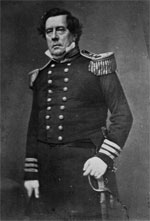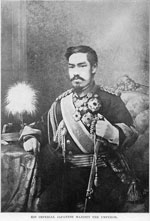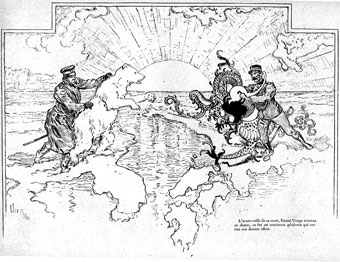 CAUSES of the WAR
CAUSES of the WAR

The war between Russia and Japan was a fight for disputed territory. Its immediate cause was the failure of the two nations to agree on the relation which each should maintain toward Korea and Manchuria. The underlying cause of the struggle was the mighty clash that was bound to come when those measures which Japan believed were necessary to her self-existence met the glacier-like progress of Russia toward the Pacific. -- James H. Hare, ed., A Photographic Record of the Russo-Japanese War.

United States Commodore Matthew Perry. William Itoh collection.
Causes, Part One: Opening of Japan
The hostilities began when Japan attacked the Russian fleet off Port Arthur, Manchuria, China, on February 8, 1904 but the reasons for the war were deeply rooted in history. For Japan, the issues leading to the conflict might well have begun in the seventeenth century. Fearing the influence of foreigners, especially Christians, the Shogunate rulers of Japan closed the country in 1639, permitting no foreigners to enter and no citizens to leave. This situation continued until 1853 when United States Commodore Matthew Perry with four warships steamed into the harbor of today's Tokyo to force the country to open its doors to the outside world. Perry's immediate concern was the rough treatment given sailors on stranded or disabled whaling vessels by the Japanese. The show of military strength, repeated the following year by Perry, established the United States as a powerful but commercial presence in the Far East. For decades American merchant ships had made profitable voyages to the Pacific and with the occupation of Hawaii, the purchase of Alaska, and acquisition of the Philippines, the United States was now poised to become a worldwide power.

Emperor Meiji. Harper's Weekly.
Japan remained wary of the European nations and had only to look at China to see what might happen in the future. Large in land mass and population, China was no match for the military forces of Europe, who dominated China with treaty ports and commercial spheres of influence and eventually occupied Beijing during the Boxer Rebellion. Japan was determined not to suffer the same fate. Within decades of Perry's visit, Japan transformed itself into a modern industrialized nation capable of resisting European colonial aspirations. Japan restored the emperor Meiji, rapidly developed a massive industrial capability, and built a well-equipped modern military force.
Russian Movement
At about the same time Perry came to Japan, Russia was completing its eastward expansion to the shores of the Pacific, establishing a port on the Amur River in 1850 and then occupying Sakhalin Island, just northwest of Japan. An important Russian goal was to have a Pacific warm water port as Vladivostok was ice-bound for three months of the year. The Tsar and expansionistic forces within Russia were also casting eyes on Korea and China's Manchuria province, causing legitimate concern by the Japanese. The occupation of Korea by Russia, Japan feared, would put it next in line for Russian conquest. Korea's strategic value lay in its position, just 120 miles across the Tsushima Strait from Japan.
In 1875, Japan and Russia solved their immediate differences with a treaty that gave Russia possession of Sakhalin Island and Japan the Kuril Islands, which extend north of Hokkaido.

